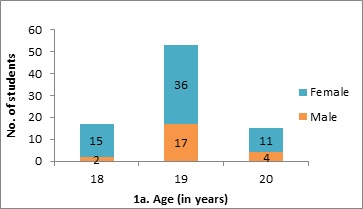Evaluation of stress parameters in new medical entrants based on their admission criteria to a south Indian medical college
Abstract
Objectives: Globally medical education is now recognized as a highly stressful course and students that enter this program are subject to multiple stress producing factors that affect their academic performance as well as their mental and physical well being. This study was done to determine the prevalence of stress among first year medical (MBBS) students based on their admission criteria and to identify the sources of stress among them.
Material and method: A Cross sectional study. The study was conducted in a semi-government medical college, Kerala, India. Subjects included first year medical students (both male and female) enrolled in the college during the year of study.
Interventions: GHQ-12 Questionnaire was used to assess the psychological stress. A pretested structured closed ended questionnaire to collect information regarding the academic and non-academic sources of stress was charted out.
Result: A total of 100 students were admitted to the first year of which 85 consented to take part in this study. Of the 85 students, 42 (49.4%) were having stress. Of these, 35 (83.3%) were repeaters (attempted the medical entrance examination more than once) and among them, 26 (61.9%) were students who secured admission based on merit. A statistically significant association was seen between the number of attempts, admission criteria and stress (p<0.05). The main academic stressors identified were language of communication, peer competition, long working hours, frequent examinations and increased study work load. The main nonacademic stressors identified were parental pressures, decreased recreation period and stay away from home.
Conclusions: This study found that stress was more among repeaters and those who secured admission based purely on merit. Nonresident Indian (NRI) students who secured admission through higher financial investments along with sudden displacement from home environment also suffered from significant stress levels. The possible sources of stress found in the study can be a preliminary step towards developing solutions for stress management and stress prevention in new medical entrants which could help in developing a new generation of stress free doctors capable of effectively providing high quality medical care to the community at large.
Downloads
References
Shawi AFA, Abdullateef AN, Khedher MA, Rejab MS, Khaleel RN. Assessing stress among medical students in Anbar governorate, Iraq: a cross-sectional study. Pan Afr MedJ. 2018;31:96. DOI: https://www.dx.doi.org/10.11604/pamj.09/10/2018.31.96.16737. eCollection 2018.
Sherina MS, Rampal L, Kaneson N. Psychological stress among undergraduate medical students. Med J Malaysia. 2004;59(2):207-11.
Waqas A, Khan S, Sharif W, Khalid U, Ali A. Asso-ciation of academic stress with sleeping difficulties in medical students of a Pakistani medical school: a cross sectional survey. PeerJ. 2015 12;3:e840. DOI: https://doi.org/10.7717/peerj.840. eCollection 2015.
Ko SM, Kua EH, Fones CS. Stress and the under-graduates. Singapore Med J. 1999; 40 (10): 627-30.
Saipanish R. Stress among medical students in a Thai medical school. Med Teach. 2003;25(5):502-6. DOI: https://doi.org/10.1080/0142159031000136716
Shapiro SL, Shapiro DE, Schwartz GE. Stress management in medical education: a review of the literature. Acad Med. 2000;75(7):748-59.
Goldberg DP, Blackwell B. Psychiatric illness in general practice: a detailed study using a new method of case identification. Br med J. 1970; 2(5707):439-43. DOI: https://doi.org/10.1136/bmj.2.5707.439
Gade S, Chari S, Gupta M. Perceived stress among medical students: To identify its sources and coping strategies. Arch Med Health Sci 2014;2(1):80-6. DOI: http://www.amhsjournal.org/text.asp?2014/2/1/80/133845
Tyssen R, Vaglum P, Grønvold NT, Ekeberg O. Suicidal ideation among medical students and young physicians: a nationwide and prospective study of prevalence and predictors. J Affect Disord. 2001;64 (1):69-79. DOI: https://doi.org/10.1016/S0165-0327(00)00205-6
Bergmann C, Muth T, Loerbroks A. Medical students' perceptions of stress due to academic studies and its interrelationships with other domains of life: a qualitative study. Med Educ Online. 2019; 24 (1): 1603526. DOI: https://doi.org/10.1080/10872981.2019.1603526.
Kumar B, Shah MAA, Kumari R, Kumar A, Kumar J, Tahir A. Depression, Anxiety, and Stress Among Final-year Medical Students. Cureus. 2019;11(3):e4257. DOI: https://dx.doi.org/10.7759%2Fcureus.4257.
Marazziti D, Presta S, Baroni S, Silvestri S, Dell' Osso L. Behavioral addictions: a novel challenge for psychopharmacology. CNS Spectr. 2014;19(6):486-95. DOI: https://doi.org/10.1017/S1092852913001041. Epub 2014Mar 4
Galante J, Dufour G, Vainre M, Wagner AP, Stochl J, Benton A, et al. A mindfulness-based intervention to increase resilience to stress in university students (the Mindful Student Study): a pragmatic randomised controlled trial. Lancet Public Health. 2018;3(2):e72-e81. DOI: https://doi.org/10.1016/S2468-2667(17)30231-1. Epub 2017 Dec 19.
Malpass A, Binnie K, Robson L. Medical Students' Experience of Mindfulness Training in the UK: Well-Being, Coping Reserve, and Professional Development. Educ Res Int. 2019; 2019. DOI: https://doi.org/10.1155/2019/4021729. Epub 2019 Feb 3.
Klawonn A, Kernan D, Lynskey J. A 5-Week Seminar on the Biopsychosocial-Spiritual Model of Self-Care Improves Anxiety, Self-Compassion, Mind-fulness, Depression, and Stress in Graduate Healthcare Students. Int J Yoga Therap. 2019 May 30. DOI: https://doi.org/10.17761/D-18-2019-00026.
Cameron D, Dromerick LJ, Ahn J, Dromerick AW. Executive/life coaching for first year medical students: a prospective study. BMC Med Educ. 2019;19(1): 163. DOI: https://doi.org/10.1186/s12909-019-1564-4.
Cotton, S., Dollard, M. and De Jonge, J. Stress and student job design: Satisfaction, well-being, and performance in university students. International Journal of Stress Management 2002:9(3):147–162.
Ogba FN, Ede MO, Onyishi CN, Agu PU, Ikechukwu-Ilomuanya AB, Igbo JN et al. Effectiveness of music therapy with relaxation technique on stressmanagement as measured by perceived stress scale. Medicine (Baltimore). 2019;98 (15): e15107. DOI: https://doi.org/10.1097/MD.0000000000015107



 OAI - Open Archives Initiative
OAI - Open Archives Initiative


